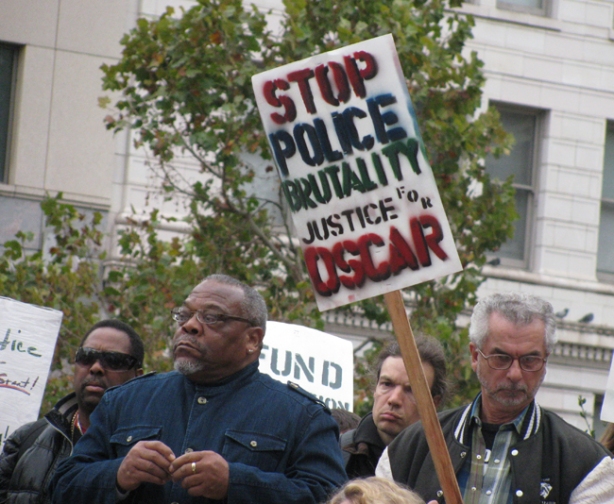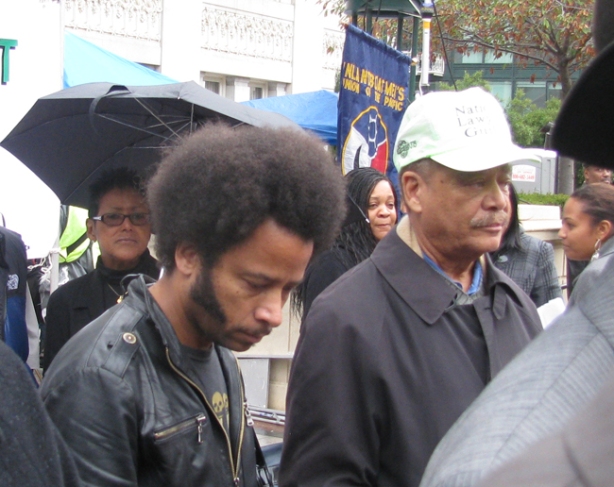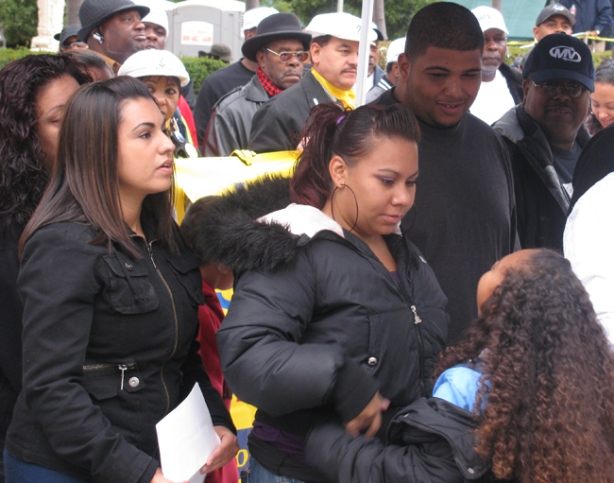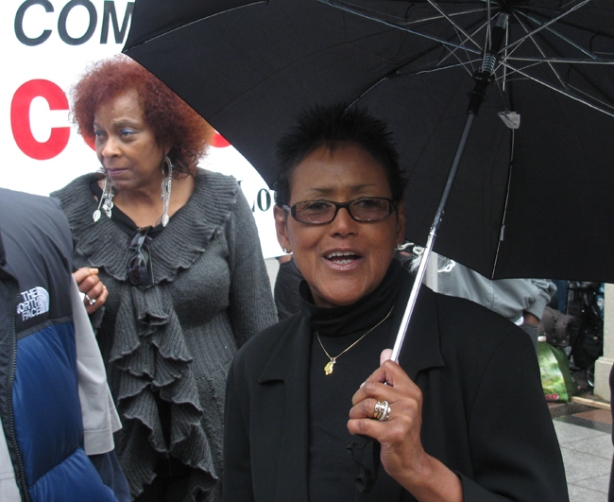 It’s time to dispel a pervasive myth. It’s one that suggests Black people are quick to protest incidents of police brutality but nowhere to be seen when it comes to dealing with crime in the community. During the 20 months of protests around Justice for Oscar Grant we’ve all been to town halls where some ‘well-meaning person will stand up and make what they consider a ‘be all end all’ statement about how everyone is misguided for protesting police brutality when we have Black on Black crime happening everyday.
It’s time to dispel a pervasive myth. It’s one that suggests Black people are quick to protest incidents of police brutality but nowhere to be seen when it comes to dealing with crime in the community. During the 20 months of protests around Justice for Oscar Grant we’ve all been to town halls where some ‘well-meaning person will stand up and make what they consider a ‘be all end all’ statement about how everyone is misguided for protesting police brutality when we have Black on Black crime happening everyday.
We’ve all read editorials or heard callers on radio talk shows lay claims along these lines; “We are our own worst enemies” “How can we expect the police not to kill us when we keep killing each other” or “Where are all the protests when we’re shooting each other in the hood?”
Now on the surface such remarks seem like a strong dose of tough love where some concerned community member or leader is attempting to redirect misguided anger away from the police and back onto us.. They are supposedly helping get our priorities in order. However, such conclusions are deeply flawed, play into troubling stereotypes and are simply erroneous.
The truth of the matter is we do care about our communities. How we handle complaints against a public servant who we pay with our tax dollars may be very different then how we deal with Ray Ray the Thug who lives in our hood and is causing problems. And to be quite frank, we’ve long had ‘Increase the Peace’ rallies, ‘Stop the Violence‘ summits Summer Jam festivals to raise money for peace organizations etc all in our communities. Why some insist on acting like they don’t happen is beyond me. It suggests that those who make such claims are disconnected from the people and neighborhood they critiquing.
It’s interesting to note some of these assertions about lack of peace efforts are now increasingly being put forth by police, police sympathizers and right-wing pundits who start off by dismissing activists, protestors and community leaders as misguided or disingenuous for protesting the police but ‘remaining silent’ to Black on Black crime. Here’s an example of what one police sympathizer posted up on my site the other day.
For the advocates, politicians, religious leader and other community leaders, I found that a lot of you have a habit of getting on the soapbox and crying foul and social justice to your followers when the opportunity avails. However, where are you all when there is/are (1) Black-on-Black or Brown-on-Brown crime, (2) schools are falling apart, (3) affirmative action was eliminated in good old liberal Cali, (3) young Black, Latinas and Asian girls being pimped and exploited [look no further than International Blvd/14th], (4) job/economic development opportunities, (5) low voter/political participation and (6) businesses being looted and temporary shut down that affect jobs and revenue. Where were you all when the young track star was gunned down or the pregnant women were shot or the boy was paralyzed by a stray bullet during piano practice. Where were you? Yes, the typical response to the usually dumbfounded individual when posed the question by the reporter… after trying to find those right words to say, is to blow off the question and stress that injustice of the “racist police” must stop and Oscar Grant’s death will not be in vain. If I was a family member of a victim of crime, I would be saying WTF, where were you all at for me. But, I have found that in the Bay Area, it is better to scream, shout, and react rather than putting deeds to words and being proactive in getting results. Too many of these so-called leaders or voices of the community have been talking (ala Tea Party, Glenn Beck, Fox News etc.) without doing any walking or showing tangible results. And many of them have a hard set take it or leave it mentality (ala Republicans) or it is you and not me mentality. And to tell you the truth, I (and probably the majority of other in Black and Oakland community) are getting real sick of the B.S and rhetoric from these glory hounds.
Here’s another example of a police officer who came out for the Pro-Johannes Mehserle rally in Walnut Creek earlier this summer. He’s the white guy with the baseball hat and you can hear him raising the same questions; Where are you when y’all are out there killing each other?
http://www.youtube.com/watch?v=ZFtjO91dW9g&feature=related
Now on the surface such remarks sound somewhat ‘logical’ if you watch the news and see coverage of an Oscar Grant protest and don’t see coverage of protests or vigils for victims of crime. The truth of the matter its a false narrative.
For example, several days ago I challenged the person who posted this accusation where he accused organizers of being glory hounds to give me a list of names of organizers who are out there protesting at Oscar Grant rallies, but not doing community based work designed to uplift and heal the community. I also posted up this challenge on my twitter feed. It’s been 4 or 5 days and that person nor anyone else has yet to produce such a list. The reason is because when it comes down to it, it was all talk. This poster like most critics who echo the sentiment of ‘Where y’all at? was nowhere to be found himself.
In addition, his sweeping statements conveniently discounted the fact that almost all the main organizers behind the Oscar Grant movement have long been involved with healing work in the community. Many are part of organizations that specifically work with at risk youth everyday.

Many of the organizers and activists that have fought for Justice for Oscar Grant have been doing work in their respective communities for a long time. That would include folks like Tony Coleman and spoken word artist Ner City
If he or anyone else actually did look up names then they would’ve discovered most of the folks out there at those rallies come from organizations like Leadership Excellence, Youth Speaks, Eastside Arts Alliance, Black Dot Cafe, Homies, United Playaz, Youth Uprising, Barrios Unidos, Urban Peace Movement, Youth radio, Colorlines, Zulu Nation, Grind for the Green, Silence the Violence, POCC, Ella Baker Center, All of us or None, Love Life Foundation, Malcolm X Grassroots Movement and this is just a short list. Point being… all these organizations as well as the numerous churches ranging from Allen Temple, Olivette, the Nation of Islam etc. involved with seeking Justice for Oscar Grant do work every single day in the community. They do this work without the glare and spotlight of TV cameras.
Much of what they do is not glamorous work. It doesn’t make for good TV news coverage. After all, as most who put in work will tell you, it takes more than a march and a vigil to turn things around in the community. It’s about building trust and nurturing relationships. It’s about teaching folks conflict resolution. It’s about trying to find ways to uplift people’s self-esteem. It’s about being there for those who are in the most distressed situations and helping those find ways to heal those who are lashing out because of past traumas as well as heal those who are victims. There are no easy solutions.

Do we really only come together to protest the police? Almost every last one of the mostly religious leaders pictured here has programs that specifically deal with violence in the community. Look them up, check their record
Many of these organizers are also the ones that frequently serve as long-term mentors to the troubled youth they encounter. Other work with them in art and cultural programs where they can express themselves as a way to healing and finding new direction. Many work in the schools or have been a part of leadership camps where they volunteer their time. Others have given money. Still others go behind the walls either to prison or juvenile facilities to work with those who are usually shunned and discarded. Many do work where they help those who just out of jail transition back into society. Very few have sat back and placated violence in the community. One has to question the sincerity of those who would suggest that. Common sense would tell you otherwise.
With respect to protesting police brutality, there’s a few points we should be clear on. First marches and rallies around instances of police brutality usually happen when the most egregious situations go down. I.e. the shooting death of an unarmed Black man. Not every assault, abuse and humiliation has resulted in a huge show of support. Perhaps they should because then folks who live outside those communities most subjected to police abuse would understand how pervasive and widespread it is. But sadly many find themselves spread thin because they are already doing other critical work in the community.
Most organizers understand police misconduct is systemic and requires long-term solutions where your both pushing for change within the department and pushing for accountability mechanisms on the outside via legislation. Because the police are part of the government which our tax dollars pay for, one may use a variety of tactics to bring attention to a concern and petition for change. Hence a large march and rally in front of city hall in theory sends a strong message to lawmakers the community is upset and is demanding changes.
Lawmakers at City Hall looking out their windows and seeing a large protest understand the end result could be the community voting them out of office if they ignore their demands. Lawmakers understand that a protest could lead to community members withholding campaign contributions in future elections. They also understand that lack of response to a protest could result in a costly disruption of business as usual. Voting, Protesting and economic punishment are the languages many law makers understand and so a skilled organizer applies them.
This leads us to a deeper understanding of the dynamics at play when we’re dealing with the police. Keep in mind, we pay their salary, training and equipment with our taxes. They are hired to protect and serve us and have been given an array of powers including the right to carry firearms and use deadly force to help them carry that out their duties. When they fail at their job it’s a big deal because much has been invested in them and much is expected.
This is no different then the way we collectively act when an airplane crashes versus a car. Car crashes happen more frequently, but when plane crashes our societal confidence is shattered and we quickly seek ways to ensure the public not to be afraid of boarding a plane again..
When incidents of police brutality occur it shatters the confidence we as people are supposed to have in them and the system. People stand up to seek justice as a way to restore faith into the process we are told we need to take to address grievances. When that also fails which is how many saw the judges sentencing decision of Johannes Mehserle, people move dangerously close to completely checking out and being despondent or they become extremely angry and start rebelling.
We don’t have the same political investment and focused social expectations of the neighborhood thug. In many ways we feel at the end of the day we have as a community have the tools and resources to ultimately contain and shut down the thug. In the back of many people’s minds we simply have not exhausted all our options. It’s only when we feel we dont have final say so over the thug do we as community react the way we do when the police kill someone.

M-1 of dead prez noted our reaction or lack of reaction to police terrorism centers on how we deal with power
Right now we don’t feel we get the last word with the police..I think M1 of dead prez said it best on our radio show yesterday.. This all boils down to power and who ultimately has it. In theory the people are supposed to have it, but thus far the police as an institution have positioned themselves as the final power broker over various marginalized communties in particular Black and Brown.
With the Oscar Grant killing we saw the police exercise that power by executing him for all to see on the eve of the inauguration of nation getting its first African American president-(January 1 2009) Grant’s public slaying was a brutal reminder to folks that even with a Black President in the White House, you have no power.
That feeling of powerlessness motivated a lot of people to seek justice and turn the tables. Lots of obstacles were tossed in the way and with each step they were overcome and done away with by those seeking justice.. The DA was changed, the BART police chief forced to resign, officers were fired and for the first time in California’s history, a white officer was brought to trial in criminal court for the murder of a Black man. The balance of power was shifting resulting in a people starting to believe the system could be something we could depend upon thus giving the people final say so.
Unfortunately but not surprising, there was major push back as the police departments throughout the state sought to retain their hold. Every single police union in California came to Sacramento pledging support for Johannes Mehserle. They chipped in resources, paid for his lawyer and basically went all out to help him win his trial.
When Judge Robert Perry went out of his way to side with the police and blame Oscar Grant for his own death, it was a cruel reminder to the family and the community at large that we dont have power especially within the system we invested in.
Bottom line is that some of the police brutality cases are much more then isolated incidents. They are major markers that indicate there’s an opportunity to flip the script, dismantle or at the very least, peel away some layers from an oppressive institution. With this in mind, when you hear someone complain that our community is protesting the police but seemingly not protesting the the day to day violence, its hard not to see this as a ploy to keep us from challenging an institution that needs to be held accountable.
Take a second look at that video from the Pro-Mehserle rally and see if you see a man (the white cop) who is genuinely concerned about the loss of Black lives in the hood or someone who simply wants to hold onto power at all costs.
As for the ‘concerned community’ members who raise these questions… well some folks have always been afraid of us leaving the plantation and being free.
Something to ponder
Davey D





